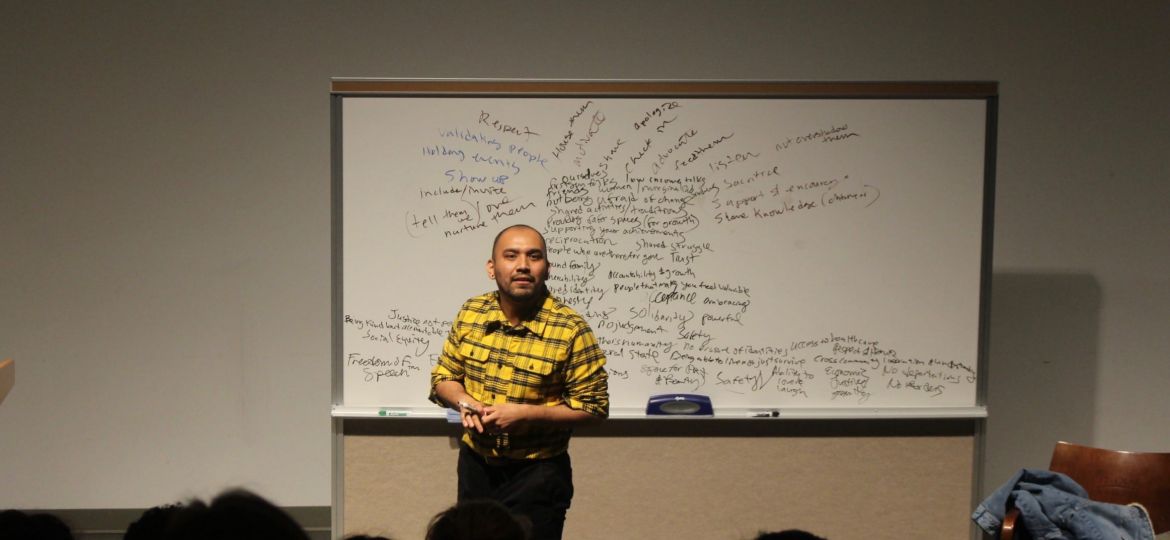
Writer, culture critic and public speaker Rubén, better known as Queer Xicano Chisme, gave St. Olaf students the opportunity to heal and explore what community means to them on Tuesday, Nov. 13. The Political Awareness Committee (PAC) hosted Rubén’s workshop, titled “Tending to Intangible Wounds: On Community, Healing and Care,” in response to the Spring 2017 protests against institutional racism at St. Olaf.
PAC Social Media Director Danely Quiroz ’21 opened the event by speaking about what she perceives as an inadequate and ineffectual response on the part of the administration to the acts of racism committed during the 2016-17 academic year.
“The people packed in this room are the very people most affected by violence and neglect from this institution,” Quiroz said at the beginning of the event. “I first stepped into this campus the year after the threatening series of racism, specifically xenophobic and the anti-black hate crimes from 2016 through 2017. Rather than the College speaking about these incidents, the entire class [of 2021] had to sit through poorly done drama skits done by a mostly all-white cast about microaggressions. I remember how angry I was.”
Queer Xicano Chisme is a content creator who curates a social justice blog, creates YouTube videos, podcasts and leads workshops at colleges and other organizations. He focuses on “Latinx/Chicanx issues, QTPOC [Queer & Trans People of Color], lived and generational trauma, survivor advocacy, pop culture, social justice and the ethical application of radical ‘chisme,’” according to his website.
Queer Xicano Chisme’s workshop centered around a community tree that he helped the attendees build. He started by asking the group, “What does liberation mean to you?” It took a while for people to feel comfortable answering, but soon they started responding. with answers speaking of freedom of expression, economic opportunity and the pursuit of a happy life. Queer Xicano Chisme wrote these answers along the bottom of a whiteboard. These words became the roots of the tree.
He then asked, “What does community mean to you?” Responses included: “A sense of belonging,” “embracing,” “powerful” and “reciprocal.”
“Reciprocation is a really good one and one that takes a minute to understand, especially if you are someone who was raised to think you have to provide what we call emotional labor for other people,” Queer Xicano Chisme said. “You have to hold space for other people constantly all your life.”
He pointed out that this especially affects women and femmes – people who express and/or identify with femininity – particularly women and femmes of color. He emphasized that community is a give-and-take and does not solely involve self-sacrifice.
Community also involves respectfully holding each other accountable, Queer Xicano Chisme said.
“Unless we actually, actually hate these people, not just their opinions, we come from a place of kindness and understanding when we engage them,” he said.
This definition of community made up the trunk of the metaphorical tree he helped attendees build.
“Who is community?” he asked. “How do we show we care for our community?” These answers formed the branches.
“How does community make you feel?” he asked at the end of his talk. These answers were the leaves. He said that the St. Olaf tree is one of the happiest community trees he has ever built.
“I’m part of the LGBTQ+ community and think it’s always good to hear from diverse voices and experiences within this community,” Annika Peterson ’21. “Queer Xicano Chisme was a great speaker, very engaging with a college-aged audience and very knowledgeable about activism. I think the St. Olaf student body can learn a lot from speakers like him.”
“I like this idea of a workshop to work on something the community needs and I think that it was really nice for the people there, but I wish that there could have been more people there to make it a more effective exercise in terms of community healing as it was advertised,” Eleanor Morse ’19 said.
















